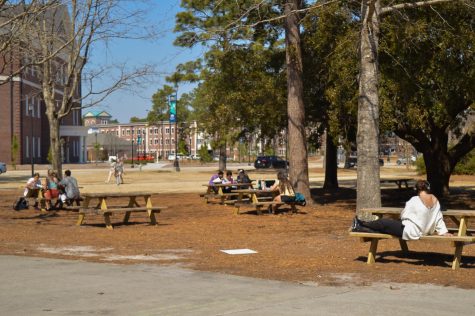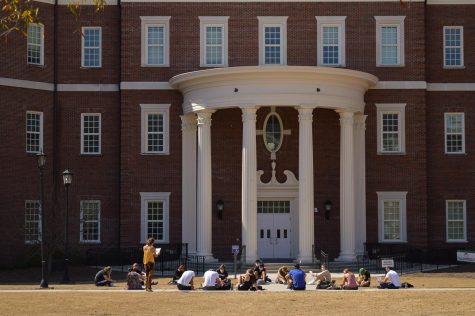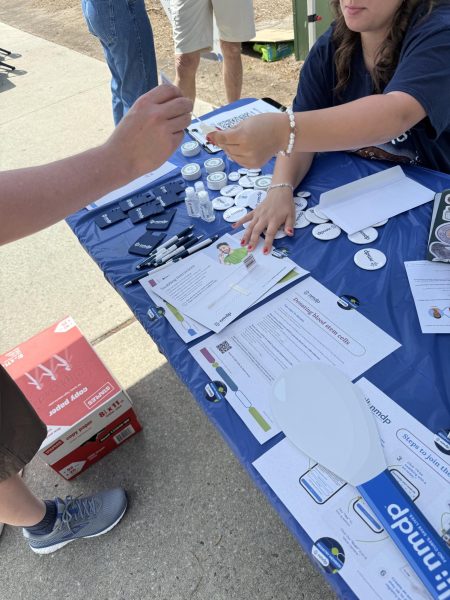How UNCW’s new COVID guidelines are affecting the campus experience
On August 24, Chancellor Jose Sartarelli released a message to the student body in response to the results of UNCW’s first day of surveillance testing. The message announced the cancellation of the Involvement Carnival, originally scheduled to take place the next day, and called for all “[e]vents, activities and meetings not directly related to student learning or coursework” to be moved online. Activities that cannot make the transition were instructed to be postponed. There are not any exemption applications or future reevaluations available at this time.
Stephanie Norris, interim executive director of Campus Life, explained the reason behind the new policy.
“The increase in COVID-19 cases on campus and the high-transmission rates in our county and across most of North Carolina [prefaced this decision].” Since the start of UNCW’s surveillance testing for all unvaccinated members of the campus community, over 500 students both on and off campus have tested positive for COVID-19. “There are many professionals on campus and in the local community that talk regularly and are working to keep students, faculty, staff and the community as safe as possible.”
The policy’s main changes include all non-academic, on-campus events being moved online and residence hall visitation by non-residents being temporarily denied. Outdoor recreation fields have not been affected by this change, allowing intramurals and club sports to continue activities with masks. There are also several “grab and go”, service, and community-based events still happening across campus.

For most student organizations, though, this has meant the shift back to the virtual formats of last semester. This has been met with mixed reactions throughout the student body, from new students to current club members all the way to club presidents.
Michael Delano, president of Flicker Film Society, recalls his reaction to the announcement.
“The day of the change was right before the Involvement Carnival was supposed to happen. That was our best way of introducing people to Flicker Film and attracting new members, so with that being cancelled, we had to change up our approach. We transitioned to some online advertisement through social media and have gone through professors as well to their students. And now we’re meeting on Zoom again. But, obviously, it’s not quite the same as in person.”
Kris Juengling, a first-semester freshman this year, has been affected by the new policy as well. Being new to campus, Juengling’s expectations were hopeful for the coming year previous to the delta variant’s rise. However, after the cancellation of the Involvement Carnival, he has had a hard time discovering student organizations.
“I haven’t been keeping up with [online events], honestly,” said Juengling. “I’m much more of an in-person kind of guy. Now, how I’ve been finding things is through social media, stumbling upon clubs and events that I might be interested in. I honestly feel like a lot of stuff is going under the radar this way.”
Like Flicker Film, many other clubs have used this social media approach. As Juengling suggests, it has been imperfectly helpful. While some opportunities have gone unacknowledged, others have gained traction through a more active presence online. The ability to market a club through a strong social media presence is what has been most essential for gaining new members. For some of the smaller organizations, this is difficult to achieve.
With some digging, though, community can be found. Delano has seen results of this tactic himself.
“Over the past two years, we’ve had more freshmen coming in now that clubs are the one opportunity to do something, even if online. It’s been encouraging to see people finding friends and a community that they couldn’t elsewhere.”

Emma Hudson, a member of the Theta Xi chapter of Kappa Delta, has observed the spectrum throughout her involvement. While many of her sorority sisters have struggled to find connection, others have thrived by prioritizing activity.
“The member retention rate has dropped dramatically during the pandemic. For a lot of people, the whole point of joining is to establish social connections, so when there are no in-person events to do that, it is disheartening. Still, what I’ve seen with Greek life is that you get out what you put in. So during the pandemic, it is important for both new members and old members to doubly put themselves out there to form connections with each other.”
Hudson has seen this personally during her time last year as vice president of public relations and this year as a regular member highly involved in the recruitment process. When asked her opinion on the guidelines, she stated their necessity.
“As much as we value being in person with our potential new members, I think it’s important to think about the safety of others. We were able to deal with the downsides of recruitment being online this year by being more creative and flexible to the platform to keep it fun for everyone. I think as long as we continue to value genuine connections, we will be able to get past the negative aspects of COVID-19 and continue to have a great year together.”
The events Delano had previously planned for Flicker Film—screenings, workshops, guest speakers, and more—are now up in the air with the change.
“There’s frustration in the fact that [the COVID-19 outbreak on campus] couldn’t have been prevented sooner and that we had to cancel other events because of choices made previously. But obviously, I am happy to do anything to keep Flicker Film meeting together and engaging as a campus organization.” Having to work around the online format has made Flicker’s goals—collaboration and networking—more difficult to achieve, but Delano is still hopeful for the coming year, like so many other students on campus.
There is a struggle with the new guidelines across the campus community. While many recognize their importance, it is still discouraging that online events are continuing to be the reality. Still, UNCW’s students have remained resilient throughout the pandemic. They have found ways to build community with one another despite the virus’ persisting presence.
“Obviously, I am disappointed,” said Juengling on COVID-19’s effect on campus life. “You can’t help but hate when things are restricted and not as they’re supposed to be. But I am glad we still have something. The fact that we’re on campus is worth it for me because that alone allows you to connect with people. I’m willing to sacrifice some of the normal college experience for what we do have right now.”











